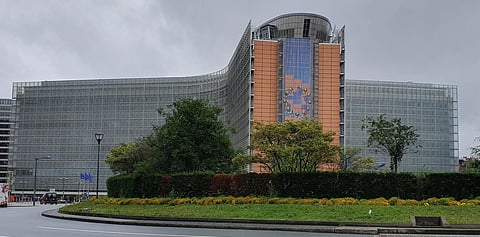

The European Commission is set to propose significant restrictions on steel imports, aiming to safeguard the bloc's beleaguered steel industry from overseas competition.
Officials plan to halve current import quotas and raise tariffs on excess volumes to 50 percent, aligning the measures with those recently adopted by the United States and Canada.
These changes, part of a comprehensive package for the steel sector, are scheduled for unveiling on October 7.
Excess global steel capacity, projected by the OECD to reach 721 million metric tons by 2027, has been a key concern, driven largely by subsidized production in China.
Chinese factories accounted for more than half of worldwide steel output last year, contributing to a surge in low-cost imports into Europe.
This influx has eroded profit margins for EU manufacturers, compounded by soaring energy prices on the continent.
The European steel sector, which employs approximately 300,000 people, has shed nearly 100,000 jobs over the past 15 years.
To bolster defenses, the EU implemented additional cuts to steel imports by 15 percent starting in April.
The Commission is also examining potential safeguards for aluminum and export duties on scrap metal to address broader vulnerabilities in the metals market.
The new measures could pave the way for a renewed agreement with the United States, building on a July deal that outlined replacing 50 percent U.S. tariffs with a quota system.
EU trade chief Maros Sefcovic recently met with U.S. Trade Representative Jamieson Greer in Asia to advance discussions on a "metals alliance" aimed at protecting production from Chinese overcapacity.
Under this framework, the EU and U.S. would trade on tariff-rate quotas with low or zero duties while jointly ring-fencing their markets.
Stephane Sejourne, the Commission's executive vice president for industrial strategy, briefed steel associations and unions on the proposals during a Wednesday meeting in Brussels.
He emphasized that protecting the industry remains a top priority, especially following U.S. President Donald Trump's imposition of 50 percent tariffs on steel this year.
Canada, too, announced in July an additional 25 percent tariff on steel imports involving Chinese-melted and poured products.
Sejourne is slated to present the Commission's proposal to the European Parliament in Strasbourg on Tuesday.
Once approved, these curbs would represent a permanent shift, moving beyond temporary safeguards to provide long-term stability for the sector.